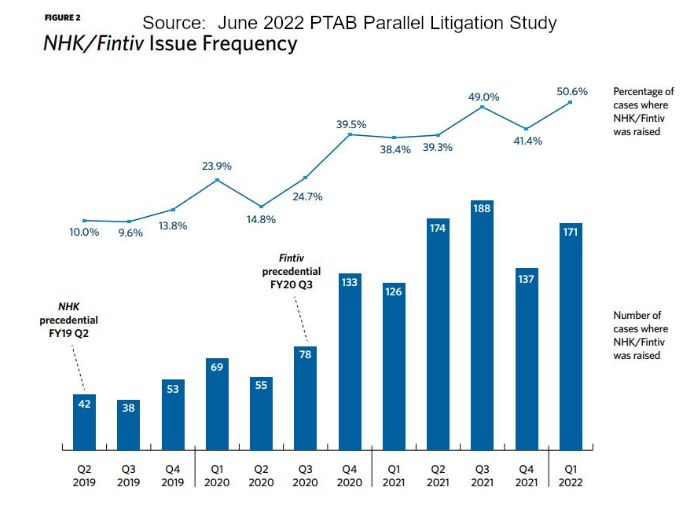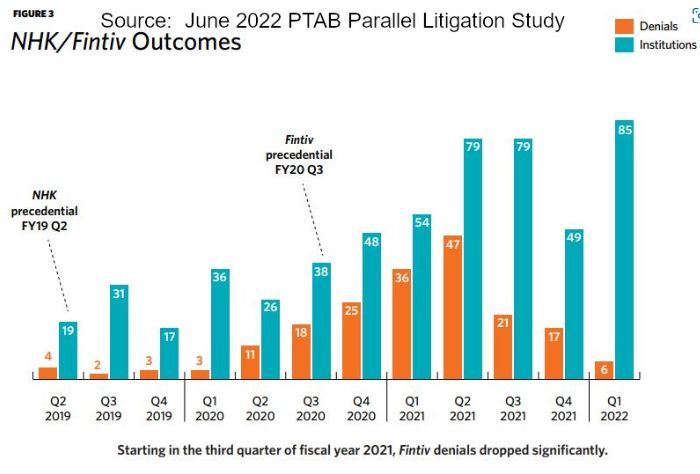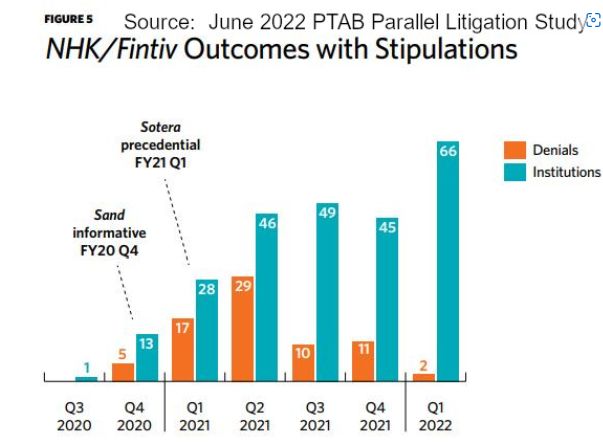On June 22, the U.S. Patent and Trademark Office issued
guidance on an interim procedure for discretionary
denials1 noting the "potential for inefficiency and
gamesmanship in the AIA proceedings."2
In 2020, the Patent Trial and Appeal Board designated the
Fintiv case precedential in an attempt "[t]o minimize
potential conflict between the PTAB and district court
proceedings."
However, in the guidance, USPTO Director Kathi Vidal notes that
"several clarifications need to be made to the PTAB's
current application of Fintiv to discretionary institution
where there is parallel litigation."3 The memo
provides that this guidance is binding on the PTAB, as it is issued
under the director's authority to govern the PTAB's
implementation of various statutory provisions.4
The Fintiv issue quickly became a hot topic raised in a
significant number of PTAB cases after its precedential
designation.
As illustrated in Figure 2 from the PTAB's recent parallel
litigation study,5 reproduced below, more than half of
PTAB cases in the first quarter of 2022 raised the Fintiv
issue.6

However, the PTAB's parallel litigation study also
illustrates, in Figure 3 reproduced below, that the number of
discretionary denials of institution based on Fintiv
peaked in the second quarter of 2021, at 47 denials, and
subsequently dropped to as low as six denials in the first quarter
of 2022.7

Now, in view of Vidal's guidance, we may see even fewer
Fintiv denials as the guidance identifies scenarios in
which the PTAB will not deny institution based on Fintiv.
Specifically, the guidance provides that the "PTAB will not
deny institution of an IPR or PGR under Fintiv" in
the following scenarios:
- "When a petition presents compelling evidence of unpatentability,"
- "When a request for denial under Fintiv is based on a parallel ITC proceeding," and
- "Where a petitioner stipulates not to pursue in a parallel district court proceeding the same grounds as in the petition or any grounds that could have reasonably been raised in the petition."8
Compelling Challenges Will Not Be Denied Institution Under Fintiv
The guidance provides that if a compelling unpatentability
challenge is presented in an inter partes review or post-grant
review petition, "that determination alone demonstrates that
the PTAB should not discretionarily deny institution under
Fintiv."9
In support of this procedure, the memo states that Congress
provided the office with significant power to revisit and revise
earlier patent grants as a mechanism to improve patent
quality.10 Thus, "compelling, meritorious
challenges will be allowed to proceed at the PTAB even where
district court litigation is proceeding in
parallel."11
During a PTAB webinar12 on July 7, the PTAB panel
further explained that compelling, meritorious challenges are
"[c]hallenges in which the evidence, if unrebutted in trial,
would plainly lead to a conclusion that one or more claims are
unpatentable by a preponderance of the
evidence."13
According to the webinar, the compelling evidence test affirms the
PTAB's current approach of declining to deny institution under
Fintiv where the evidence of record so far in the case
would plainly lead to a conclusion that one or more claims are
unpatentable.14
The webinar also explained that the compelling-merits standard is
more demanding than the reasonable-likelihood and the
more-likely-than-not standards for institution of an inter partes
review or post-grant review, respectively.15
Fintiv Doesn't Apply to International Trade Commission Cases
Specifically, the guidance clarifies that Fintiv does
not apply to U.S. International Trade Commission cases. The
guidance notes that the PTAB's NHK Spring Co. precedential case
considered a parallel district court proceeding and that the Fintiv
factors "focus on the interplay between IPRs and district
court litigation."16
Furthermore, the memo identifies differences between ITC
investigations and district court patent litigation, including the
fact that the ITC lacks the authority to invalidate a patent and
its invalidity rulings are not binding on the USPTO or a district
court.17
Because an ITC determination cannot conclusively resolve an
assertion of patent invalidity, the guidance states that denying
institution in favor of a parallel ITC investigation will not
necessarily minimize conflicts with a PTAB proceeding or a district
court proceeding. Thus, "the PTAB no longer discretionarily
denies petitions based on applying Fintiv to a parallel
ITC proceeding."18
Sotera Stipulations
If both the PTAB and a district court are adjudicating the same
validity issues, it is possible that conflicting decisions could be
rendered. Thus, factor 4 of Fintiv looks at the overlap
between the issues raised in an inter partes review or post-grant
review petition and a parallel district court proceeding.
The guidance provides, however, that a stipulation by a petitioner
that it will not pursue in district court litigation the same
grounds as in the petition or that could have reasonably been
raised in the petition — a Sotera stipulation — can
mitigate the concern of potentially conflicting
decisions.19
Thus, "the PTAB will not discretionarily deny institution of
an IPR or PGR in view of parallel district court litigation where a
petitioner stipulates not to pursue" grounds raised or that
reasonably could have been raised in the
petition.20
The guidance explains that this clarification avoids inconsistent
outcomes between the PTAB and the district court and allows the
PTAB to review grounds that the parallel district court litigation
will not resolve.21 The guidance is consistent with the
statistics illustrated in the PTAB's parallel litigation study,
as shown in Figure 5, reproduced below, that the Sotera decision
"appears to have led to an increase in stipulation filings and
a significant decrease in Fintiv
denials."22

Consideration of Median Time-to-Trial Statistics
The PTAB's reliance on a district court's scheduled
trial date for Fintiv consideration — Fintiv factor
2 — has been an issue that has drawn significant comment. The
guidance acknowledges that when applying this factor, the PTAB has
taken the court's trial schedules at face value absent some
strong evidence to the contrary.23
The guidance provides that "stakeholders correctly
noted that scheduled trial dates are unreliable and often
change."24 Thus, a district court's scheduled
trial date, by itself, is not a good indicator of whether the
PTAB's final written decision will be released before the
district court trial.
The guidance provides that parties may present "median
time-to-trial for civil actions in the district court" for the
PTAB to consider.25 The PTAB will also consider
additional supporting factors such as the number of cases before
the judge in the parallel litigation and the speed and availability
of other case dispositions.26
Finally, the guidance provides that "even if the PTAB does
not deny institution under Fintiv, it retains the right to
deny institution for other reasons under 35 U.S.C. §§
314(a), 324(a), and 325(d). For example, the PTAB may deny
institution if other pertinent circumstances are present, such as
abuse of process by a petitioner."27
Originally printed in Law360 on July 14, 2022.
Footnotes
1 https://www.uspto.gov/sites/default/files/documents/interim_proc_discretionary_denials_aia_parallel_district_court_litigation_memo_20220621_.pdf.
("Guidance")
2 Guidance at 1.
3 Guidance at 2.
4 Guidance at 3.
5 https://www.uspto.gov/sites/default/files/documents/ptab_parallel_litigation_study_exec_summ_20220621_.pdf
("Study").
6 Study at 3.
7 Study at 4.
8 Guidance at 9.
9 Guidance at 5.
10 Guidance at 4.
11 Id.
12 https://www.uspto.gov/sites/default/files/documents/PTABBoardsideChatDiscretionaryDenialsJuly2022.pdf.
13 Id. at 13.
14 Id.
15 Id.
16 Guidance at 5-6.
17 Guidance at 6.
18 Guidance at 7.
19 Id.
20 Id.
21 Guidance at 7-8.
22 Study at 5.
23 Guidance at 8.
24 Id.
25 Guidance at 8-9.
26 Guidance at 9.
27 Id.
The content of this article is intended to provide a general guide to the subject matter. Specialist advice should be sought about your specific circumstances.


